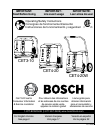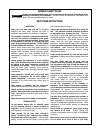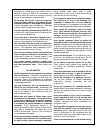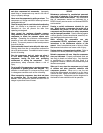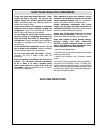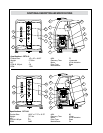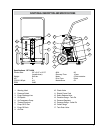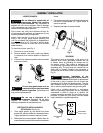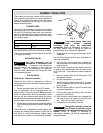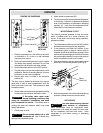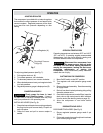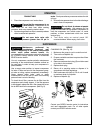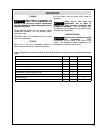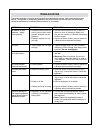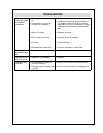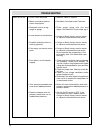
3
Entangled or snarled hoses can cause a loss of
balance or footing in addition to unintentional tool
operation. Attach the hose to the structure to reduce
the risk of loss of balance if the hose shifts.
Do not abuse the air hose. Protect all hoses from
kinks, restrictions, solvents or sharp objects. Keep air
hose away from heat, oil, sharp edges or moving parts.
Replace damaged hoses immediately. Damaged
hoses can burst or whip around work area.
Only use hoses with a minimum rating of 200 PSI.
Use
of hoses with a high pressure rating reduce the risk
of injury from a hose bursting.
Firmly grasp hose in hand when installing hoses.
If
hose is not held rmly or correctly installed, hose may
whip and injure personnel in the operating area.
Use care when lifting and carrying the compressor.
Some compressors are too heavy to be lifted by one
person. Get assistance before attempting to lift a
compressor to reduce the risk of injury.
When moving or loading a wheeled compressor ensure
that the compressor is always on a level surface.
If the
compressor is placed on a sloped surface, it may
move unexpectedly and result in personal injury.
This product contains chemicals, including lead,
known to the State of California to cause birth defects
and other reproductive harm.
Wash hands after
using.
tool use And CAre
Use this compressor and all accessories in accordance
with the instructions.
Compressor and accessories
must be used for the purpose for which they are
designed. Use of the compressor for operations
other than what is described in this manual can result
in a hazardous situation.
Use only accessories that are recommended by
BOSCH for your particular model.
Accessories that
may be recommended for a particular model tool
may not be suitable on other model tools and may
result in personal injury.
Before each use, inspect all ttings, hoses, pipes,
connections of the compressor. Do not operate if any
portion of the compressor is loose, missing, damaged,
malfunctioning, disconnected or altered. Never use
a compressor that appears damaged or is operating
abnormally.
If the compressor appears to be
operating unusually and/or making strange noises,
stop using it immediately and contact your local
BOSCH service center. There is a risk of bursting if
the compressor is damaged.
Before each use inspect compressor for signs of leaks
or damage. If leaks are found in the compressor pump,
air tanks or tubing, replace compressor immediately.
Never attempt repair leaks, weld or make
modications to the air tank or other uid conning
parts as there is a risk of bursting.
Do not attempt to operate this air compressor without
rst verifying the oil level in the crankcase. This
compressor is shipped with oil in the crankcase.
Serious damage of the compressor can result from
even momentary operation without proper lubrication.
Never operate the compressor without the safety
valve. Verify operation of the safety valve on a daily
basis. Do not use the safety valve for complete tank
drainage.
The safety valve is designed to relieve tank
pressure to reduce the risk of bursting.
Never operate compressor without all guards and
other safety features in place and performing intended
function.
If maintenance or servicing requires removal
of guard or safety feature, be sure to replace the
guard or safety feature before resuming operation of
the compressor. Replace damaged guards or safety
features immediately.
Never touch moving parts.
Do not place any part of
your body near compressor moving parts. Do not
reach around guards to reduce the risk of injury.
Do not operate compressor without the air lter.
Filters prevent large particles from entering the
air stream and damaging compressor internal
components.
Do not allow particulates such as sawdust to fall into
crankcase when crankcase is open for inspection.
Particulates in oil may reduce compressor life.
Do not use a detergent oil in crankcase.
Detergent
oils will leave deposits on internal compressor
components reducing compressor life and
components.
Do not use compressor for unattended operation.
Always remain in area when compressor is operating
and turn off compressor when not in use to reduce
the risk of re.
Never place objects on top or next to compressor.
Locate compressor at least 12 in. (30 cm) away from
all obstructions.
Restricting any of the compressor’s
ventilation openings can cause overheating and
could cause a re.
Do not operate the compressor with any power source
other than that specied in the tool operating/safety
instructions.
Use of alternative power sources may
result in malfunctions of the compressor and the
power source which may lead to serious injury of you
or others in your surroundings.
Follow all recommendations for sizes of hoses, ttings



